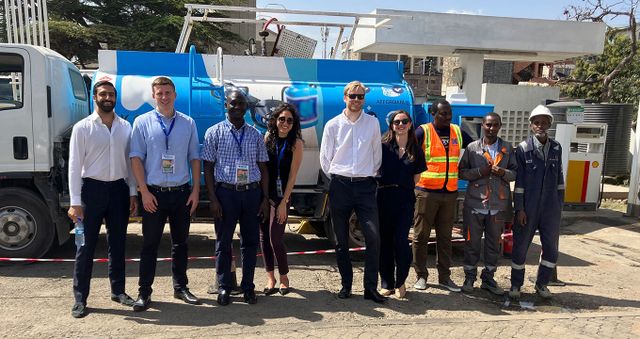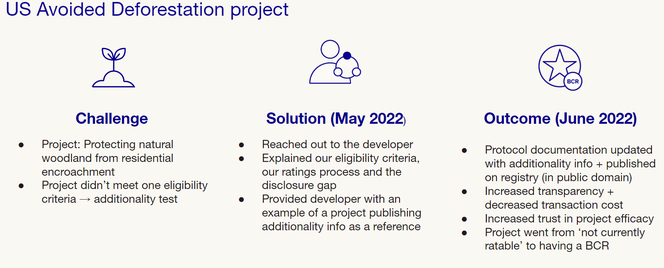
An introduction to the BeZero Carbon Project Developer Engagement Effort
Here are some key takeaways from the article
BeZero actively engages with hundreds of carbon project developers as part of our ratings process.
This network allows all developers to receive their full rating report, improve the accuracy and quality of our ratings, and incentivise transparency in the Voluntary Carbon Market.
Throughout 2023 we will be running a series of roundtables targeted at developers.
Contents
- Why does BeZero engage with project developers?
- Our engagement process
- What we have learned
- Conclusion
Project developer engagement is an integral part of BeZero’s ratings process and continuous monitoring process. It also deepens our rating team’s understanding of the issues that developers face and allows us to iterate our analytical process as we undertake research and development into new products to assess risks.
Of the 261 project developers we have so far reached out to:
52% have responded
75% of respondents have received their full rating report
In 33% of cases where feedback was received from the project developer, the public information shared was found to be material and incorporated into our assessment.
One of the biggest challenges to engaging with the remaining 48% has been the complexities associated with identifying and contacting developers. This is caused primarily by a lack of standardisation in information disclosure.
Broadening our understanding of the prevailing challenges in the market allows us to continually improve our rating process. Our objective is to provide the market with a ratings framework that meets the needs of all stakeholders.
Why does BeZero engage with project developers?
Only by maintaining an open channel of communication with project developers can we provide them with the information they need to better understand how their projects are being evaluated by the market.
The feedback we receive from developers provides us with important on-the-ground insight and project-specific expertise. When developers provide feedback that is both material to our rating and available in the public domain, we can also incorporate that feedback into our project ratings.
The belief that transparency will improve the Voluntary Carbon Market (VCM) is fundamental to BeZero, so we also encourage developers to publish what we view as the minimum amount of information required for any market participant to effectively evaluate a project’s risks.
Our engagement process
Pre-rating engagement
In the event a project's data disclosure is deemed insufficient to support a rating, we reach out to the developer in an attempt to help them provide sufficient information. At a minimum, the public disclosure necessary to inform our ratings includes information on the additionality test (or tests) carried out by the project as well as the data used to calculate the emissions reductions attributable to a project for ex-post vintages, which can comprise the change in carbon stocks, the project’s risk buffer allocations, and the baseline and leakage assumptions employed by the project. Below is an example of a project for which our engagement resulted in increased public data disclosure:

Post-Rating Engagement
While our headline ratings are accessible for free on our website, after a rating is published we proactively reach out to that project’s developer to share our full rating report, which is otherwise only available via subscription to the BeZero Carbon Markets platform.
Developers are welcome to provide written feedback to the rating brief. If deemed material, that input can trigger rating reviews and contribute to our analysis of the project.
In a recent example, our rating of one project noted a lack of data disclosure which, in our view, led to information risk. Following our request for increased information disclosure, the developer contacted the registry in order to have more project documents made public, which, once achieved, will enable BeZero Carbon to incorporate this data into our analysis.
Thought leadership engagement through project developer community building
Through regular contact with our developer network and initiatives like roundtables and public consultations, we hope to bring together a range of experts in carbon project development to gain insight and generate ideas to alleviate some of the most pervasive problems. If you are interested in joining future developer engagement sessions, please register your interest here.
Some of the market-wide issues we hope to address in these sessions include: the role of rating agencies in the VCM - addressed in our inaugural session, ‘Co-benefits in the VCM’, last December - and the appropriate balance of intellectual property protection and data disclosure that facilitates transparency on the VCM. Our goal is to encourage productive, engaging discussions that will benefit all stakeholders.
We are also currently running a public consultation on a carbon accounting template we developed to help project developers on their carbon accounting reporting; read more about it and share your feedback here.
What we have learned
Lesson 1: Difficulty Identifying and Contacting Developers
In 54% of projects for which we have reached out to the developer, the organisations we have confirmed as responsible for the rated projects were not directly listed on the registry’s project pages.
Analysis of the project documents revealed that the developers identified by BeZero were referred to using 27 different descriptors, and in several instances the project’s developer was not mentioned at all in project documents.
This difficulty in identifying project developers is one factor contributing to the varied response times following our outreach to developers. Whilst one day or less is the most common response time, the average developer response time is 21 days and the maximum lead time was 197 days.
Other factors complicating developer identification and extending response time include:
Changes in project ownership
Company mergers
Remote location of a developer with poor access to the internet
Out of date information
Lack of interest to engage with rating agencies in cases where all of their credits have already been sold (although not yet retired)
Lesson 2: Limited Data Disclosure
Public availability of data - even if not required by a project’s accreditor - is a prerequisite for any data to be considered in the BeZero Carbon rating. This mimics financial markets and is best practice for efficiency and fairness in terms of increasing transparency and supporting the integrity of a market.
Transparency reassures investors as to the legitimacy of their investments and instils confidence in the supply side. However, developers are sometimes reluctant to publish project documents due to the sensitivity of certain information contained within them.
Since we began our outreach process in early 2022, we have successfully encouraged the publication of additional information for projects across sub-sectors including Afforestation, Reforestation, and Restoration; Cookstoves; Energy Efficiency; and Grasslands.
We now find that developers are increasingly willing to commit to better disclosure of project information and are more likely to be motivated to provide public data from the outset of project development. Until data disclosure is an absolute requirement from project accreditors, projects should voluntarily lead by example.
Conclusion
Our growing developer network and the events we run for that community are advancing our understanding of the challenges developers face as the market evolves, and helping to generate ideas around the role we can play to provide developers with the necessary tools to navigate these shifts.
The complexities we have encountered with developer identification are informing the market on the need for standardised information disclosure, which we are advocating for during our interactions with various stakeholders.
Learning through our outreach allows us to finetune our engagement, building a process which satisfies all parties. We hope to continue to illustrate the value of our ratings for developers and act as an advocate for transparency in a complex and demanding market.